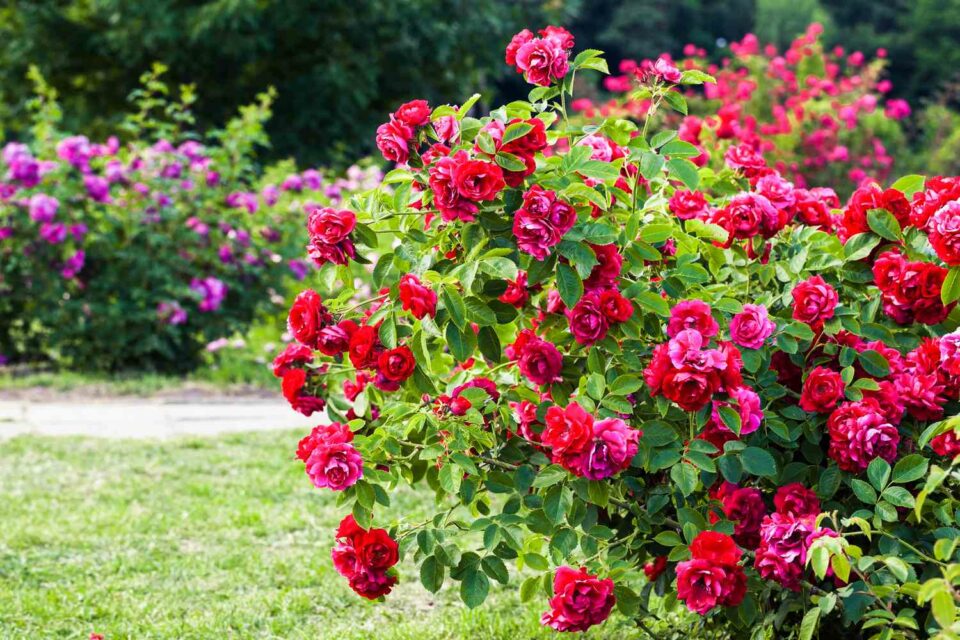How to care for roses

Watering
Roses are deep-rooted plants, so once they have settled in they can usually survive on the moisture naturally present in the soil. However, in hot, dry spells or in dry, sandy soils they may need additional water.
In their first few years after planting, new roses should be watered regularly, especially in summer, until their roots are well established.
How to water roses
When watering, direct the flow onto the soil around the base of the plant, avoiding the foliage and flowers. This helps to deter fungal diseases and avoid excess water use.
Roses in borders
Established roses should really only need watering during dry spells in high summer – when you should water up to once a week, using 5-10 litres (about one large watering can) per plant. If the blooms or leaves start to wilt, then water immediately.
Giving plants a good soak once a week, rather than watering lightly more often, encourages deeper rooting. This makes the plants better able to find moisture in the soil.
Roses in containers
These need much more water than plants growing in the ground. Water as often as needed, which could be daily in hot weather. Try not to let the
Can refer to either home-made garden compost or seed/potting compost: • Garden compost is a soil improver made from decomposed plant waste, usually in a compost bin or heap. It is added to soil to improve its fertility, structure and water-holding capacity. Seed or potting composts are used for growing seedlings or plants in containers – a wide range of commercially produced peat-free composts are available, made from a mix of various ingredients, such as loam, composted bark, coir and sand, although you can mix your own.
compost dry out, but don’t let it get
Describes soil or potting compost that is saturated with water. The water displaces air from the spaces between soil particles and plant roots can literally drown, unless they are adapted to growing in waterlogged conditions. Waterlogging is common on poorly drained soil or when heavy soil is compacted.
waterlogged either.
Feeding
Roses are hungry plants and will flower and grow better if given additional feed and mulched with well-rotted manure.
How to feed roses
Roses in borders
To encourage abundant blooms, feed twice a year:
in March/April before flowering
in mid-summer after the first flush of flowers (especially for repeat-flowering types)
Sprinkle general-purpose or rose fertiliser on the soil around the plant, at a rate of 70g per sq m (2oz per sq yd). Then
Mulch is a layer of material, at least 5cm (2in) thick, applied to the soil surface in late autumn to late winter (Nov-Feb). It is used to provide frost protection, improve plant growth by adding nutrients or increasing organic matter content, reducing water loss from the soil, for decorative purposes and suppressing weeds. Examples include well-rotted garden compost and manure, chipped bark, gravel, grit and slate chippings.
mulch the soil with well-rotted manure or garden compost, leaving a gap of 10cm (4in) around the base of the stems.
Roses in containers
These need feeding more often than roses in borders, as they have less access to nutrients.
Feed once a fortnight from mid-spring to late summer
Use a general-purpose liquid fertiliser until flower
A bud is a small, undeveloped shoot that contains the potential for new growth. Buds are typically found on stems, where they can be apical (found at the tip) or axillary (found between leaf axils) and may develop into leaves, shoots or flowers.
buds form, to encourage healthy growth
Once flowering starts, change to a high-potash fertiliser, such as tomato feed, for more flowers
Weeding
Try to keep the soil around your rose free of weeds. Roses produce some roots near the soil surface, so avoid damaging these by hand-weeding rather than using a hoe. Just take care to stay clear of the thorns! Cover the soil with a thick layer of mulch in spring to deter annual weeds from germinating.